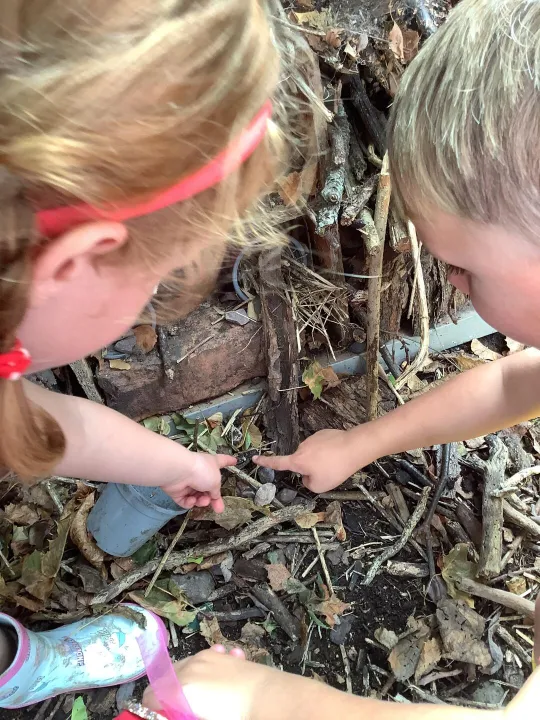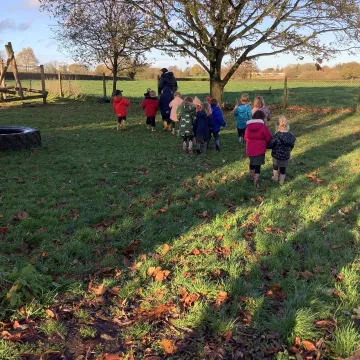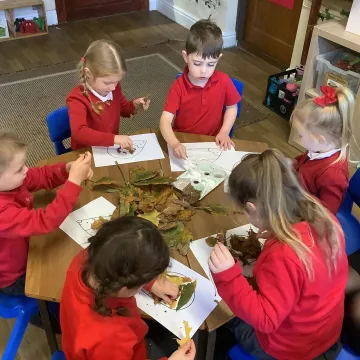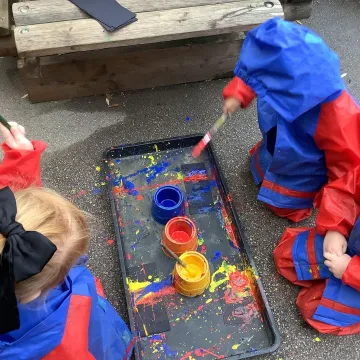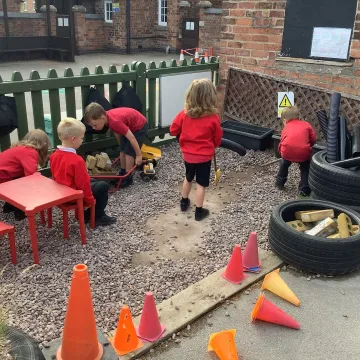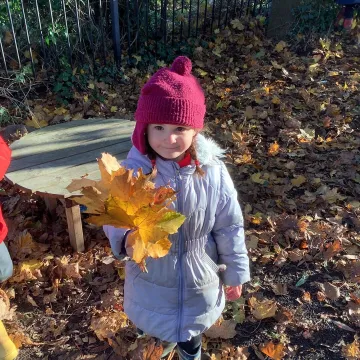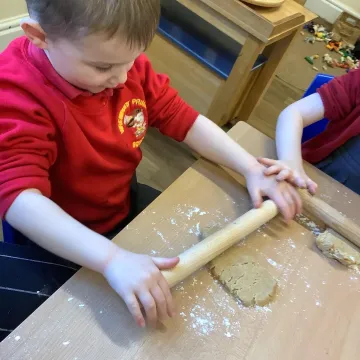EYFS
Our Early Years Offer
EYFS Curriculum – Intent
Our foundations for curriculum at Wrenbury Primary School, which begins in the Early Years, is our belief that our school is a special place, where our staff, governors, parents and children can work closely together to inspire each other and aspire for all to have high expectations, the desire to succeed and the opportunity to achieve their full potential. We strive for our school to be a place where everyone has a sense of self, a sense of place and a sense of belonging both within our rural community and the wider world; where everyone in our school family is valued for their uniqueness and individuality because 'we all matter'.
The Early Years Foundation Stage forms the essential platform onto which all development and learning can take place. All members of the school community at Wrenbury are wholly committed to ensuring that the delivery of all aspects of the Early Years Foundation Stage Framework enables every child to meet their full potential.
The Foundation Stage at Wrenbury aims to:
- Provide a safe, nurturing and stimulating environment in which children feel happy and secure;
- Encourage the emotional, personal, social, physical, creative and intellectual development of the children;
- Encourage positive attitudes to self and others and develop confidence and self-esteem;
- Create opportunities for play and learning;
- Encourage children to explore the world around them
- Provide opportunities to stimulate interest and imagination;
- Provide for equality of opportunity and anti-discriminatory practice, ensuring that every child is included;
- Extend the children's abilities to communicate ideas and feelings in a variety of ways
- Laying a secure foundation for future learning.
Principles:
Children entering our Early Years Foundation Stage do so with a varied range of experiences and knowledge. The principles behind the provision we offer reflect their range in a number of ways; they
- value the expression, views and opinions of every child;
- reflect the interest and learning styles of every child;
- ensure that no child is excluded or disadvantaged;
- provide a rich and stimulating environment;
- build on what our children already know and can do.
Wellbeing
First and foremost, we understand that children need to feel happy and safe to access their learning. We also understand that our staff's wellbeing is important to ensure that they can be the best that they can be. Through the day-to-day relationships with our youngest children, they develop a sense of belonging at Wrenbury and are within the safe and nurturing environment offered are increasingly able to understand and manage their emotions and develop positive relationship with both their and well-known adults.
Quality Texts
Reading has a high priority and underpins our curriculum at Wrenbury. Our learning is led through high-quality texts, supplemented with lots of other quality literature, including non-fiction and poetry. These quality texts come from the past and the present, from near and far and from other cultures. Children in the EYFS learn to read but are also encouraged to love books and love to read.
Each week, children also enjoy a mystery reader, whose visits help to further embed a love of stories and deepen their appreciation of literature.
Rich Vocabulary
At Wrenbury, and in the EYFS, words matter – not only words in the books shared but in play and learning and in conversation. New vocabulary is introduced and explored with the children frequently, including in Foundation Stage 2 (FS2) the use of Drawing Club. Through Drawing Club, children learn and use new, adventurous vocabulary. To help bring stories to life, children in FS2 also take part in Helicopter Stories each week, empowering them to create, dictate and act out their own stories, fostering creativity, language development and social skills.
Not only do words matter but talk matters. The skills needed by the children to communicate their wants and needs, their feelings and their learning are developed through quality interactions, questioning to support and develop their understanding and deepen their learning and by providing them with a range of opportunities for purposeful talk.
Support for learning
Children in our EYFS are entitled to and receive quality learning opportunities within our indoor and outdoor provision. All children (including those with SEND) are provided with appropriate scaffolds and models in order to succeed independently. Carefully planned learning opportunities and experiences as well as child-initiated play provide all children with the opportunity to achieve. We encourage children to learn in different ways. All children are prepared for the next stage of their learning journey in Y1.
Key concepts
Our EY curriculum is knowledge rich, creates opportunities for children to learn and apply skills and deepen their understanding of key concepts. The sequence of learning is carefully planned. Making the learning relevant and connected is an essential part of supporting children in learning more and remembering more in the Early Years at Wrenbury.
Implementation
Teaching and Learning:
The EYFS is made up of seven areas, which are sub-divided to make a total of 17 areas of learning. There are three areas known as Prime Areas:
- Communication and Language – Listening, Attention and Understanding and Speaking.
- Personal, Social and Emotional Development – Self Regulation, Managing Self and Building Relationships.
- Physical Development – Gross Motor Skills and Fine Motor Skills.
There are a further four Specific Areas:
- Literacy – Comprehension, Word Reading and Writing.
- Mathematics – Number and Numerical Pattern.
- Understanding the World – Past and Present, People, Culture and Communities and The Natural World.
- Expressive Arts and Design – Creating with Materials and Being Imaginative and Expressive.
At Wrenbury, phonics is taught through the Little Wandle programme, a structured and sequential approach that builds on children’s natural speaking and listening abilities to develop confident readers and writers. The programme, carefully designed by experienced educators, provides daily lessons that introduce sounds and letters in a logical order, supported by multisensory strategies such as songs, actions and visual prompts. Children apply their learning through closely matched decodable books, allowing them to read independently and develop fluency. Regular practice and assessment ensure that progress is monitored and any gaps are quickly addressed. Through Little Wandle Phonics, children not only acquire essential reading and writing skills but also grow in confidence and develop a lasting enjoyment of books and stories.
Curriculum Planning
In line with the EYFS curriculum guidance from Cheshire East, we have adopted the following planning structure.
Long term Planning
We have long term plans situated in all areas of the classroom, which clearly detail the learning opportunities across all areas of learning relating to that area. These are Continuous Provision Plans.
Medium term planning
At Wrenbury, we consider and plan how the main areas of learning can be linked together under termly, collective, overarching, whole school themes that are then appropriated to the different cohorts, ensuring the curriculum is bespoke to our school's context. In EYFS, we closely observe the children during their play and plan a range of adult focus activities, objective led planning (FS1) and enhancements to the classroom areas to support their learning in relation to the interests they have shared or have been observed following our whole school themes.
Foundation Stage 1 (FS1)
As part of the Wrenbury Primary School family, FS1 follow the whole school themes to ensure all children have a sense of self, sense of belonging and a sense of community, instilling our mantra 'We all matter'. The focus within FS1 is weighted on child initiated activities with a smaller proportion of the child's time spent on adult directed tasks. The adults within the nursery spend a balanced proportion of time on making observations of child initiated play which feeds into objective led planning to explore their next steps, as well modelling and extending play. Adult focussed activities are planned when applicable to further extend learning.
Foundation Stage 2 (FS2)
As in FS1, enhancements to the continuous provision plans are also made. There is a balance of adult directed and child initiated activities that take place throughout the day, depending on the age, stage of development and needs of the children at the time. Towards the end of the year, the FS2 staff support the children with their transition into the National Curriculum in line with the Statutory EYFS Framework. Children are therefore engaged in more adult directed play based learning in the summer term and independence and resilience are nurtured. We have devised a bridging curriculum which supports this transition and is followed by Reception staff in the summer term and the Year 1 staff in the autumn term.
Assessment
In accordance with the EYFS, the assessment within the Foundation Stage is carried out on an individual basis, ensuring that the development and skills of each child are monitored and evaluated properly.
Observations are made and recorded during child initiated activities. At such times, staff focus on development of new skills and understanding previously not observed. Such observations make up the majority of the total assessment for each child, but occasionally assessment occurs during adult led activities. This is in line with the Statutory Framework for the EYFS.
Every child has a Learning Journey book, which include recordings taken from observation, photographs and work produced in child-initiated activities. A secure virtual platform called 'Seesaw' is also used to record 'remarkable' moments and can be accessed by parents. Parents can also add comments to photographs and add any 'remarkable' moments of their own from home. Having Learning Journeys and 'Seesaw' provides an ongoing record of each child's progress and development throughout their time in the Foundation Stage.
Three times a year, the staff in the EYFS work together and make a best-fit judgement to decide whether a child is meeting the expected age-related level in every area of learning. All judgements are recorded on an online tracking system called 'Insight Tracking'. Planning and interventions are based on this assessment data, as well as knowledge of the individuals and groups.
Impact
EYFSP The Early Years Foundation Stage Profile (EYFSP) is completed for every child at the end of the academic year in which they turn 5. Children are assessed in all 17 areas of learning against the Early Learning Goals (ELG). The class teacher will determine (as best fit model) whether the child:
- Has met the ELG (Expected), or
- Is emerging within the ELG (Emerging)
This is moderated in school before being shared with the head teacher, the governors and data sent to Cheshire East Council as directed in the EYFSP Handbook 2021. This information is also used to support the transition in Year 1 alongside a description of each child's Characteristics of Effective Learning.
The impact of our EYFS curriculum is evidenced in the beautiful work displayed around the Early Years setting well as in the children's individual Learning Journey books. Children leave the EYFS excited about their learning, with a sense of belonging and a developing sense of self, ready for the next stage of their learning journey as they transition into Y1.
Appendix
Organisation
At Wrenbury Primary School, the Early Years Foundations Stage (EYFS) consists of two phases, Little Wrens Nursery and our reception.
Foundations Stage 1
Foundation Stage 1 children attend Little Wrens Nursery.
Whilst the nursery is part of the school offer, it is run by the governors as a section 27 provision. Entry into the Foundation Stage 1 is split into N1 and N2. N1 are children who have turned three in the previous term. N2 are children who are three and will turn four within the year.
This is a 26 full time place nursery, with FEEE funded and parent funded sessions. The day runs between 8.40am and 3.30pm. Children attend for morning sessions (8:40am-12:00pm) and afternoon sessions (12:00-3:30pm) or all day depending on what the parents choose and how many places we have available.
For admission to our Little Wrens nursery, an application is made to the school by the parent/carer. Children are enrolled if places are available.
The physical structure of FS1 affords a safe and secure environment through which the children have access to a hard surface playing area, as well as grassed and woodland areas, including a pond area. The indoor environment is within the main school in a classroom with free flow access to a covered enclosed area and an outdoor area. Children have access to toilets. We ensure that the needs of all children are met including the differing needs of children by all staff in the nursery.
Foundation Stage 2
Foundation Stage 2 children are in Reception. Entry into Foundations Stage 2 occurs at the beginning of the school year in which the children are five. Our reception cohort has a Pupil Admission Number (PAN) of 20. The children have access to a shared canopy area and outdoor learning environment with FS1, which shares our commitment to continuous outdoor provision. This area is constantly developed and adapted to meet the children's needs and interests.
All applications for a place at Wrenbury Primary School are coordinated by Cheshire East Admissions using the website below: https://www.cheshireeast.gov.uk/schools/admissions/admissions.aspx
Links with Parents:
At Wrenbury, we work hard to ensure we build positive relationships with parents, as well as children. We develop links throughout the school year by having daily meet and greet sessions from 8.40am – 8.55am. This gives parents/carers the chance to speak to the staff about any concerns or queries they may have. We actively encourage parents to share information about their child with us; this is done through comments in the reading diary, messages on Seesaw or verbally/face-to-face. At Wrenbury, we believe this is very important to help us gain a deeper understanding of the child and their interests. Throughout the year, parents are invited into school for 'Sharing Afternoons' where staff and children share their learning journeys and what they have learnt with parents/carers, as well as information sessions where parents/carers can learn about what their child has been doing and how they can support their child at home.
Across the year, at termly intervals, a newsletter and a learning journey overview are sent home containing information needed and providing a flavour of the learning for the term ahead.
Staffing, Equipment and Resources:
As part of our commitment to ensuring the highest standard of care and education to the children at Wrenbury, we have excellent levels of staffing throughout the Early Years Foundation Stage, ensuring that the staffing meets the legal ratios. Each class within the Foundation Stage is staffed by one teacher and one teaching assistant as a minimum.
There is a very strong commitment to the professional development of all staff and as such, training opportunities are identified and planned for accordingly. Equally, there is a commitment to ensuring that the resources and equipment available to children and staff are of a high standard; audits are carried out on a regular basis and resources replaced and added to as necessary.
Contact Us
admin@wrenbury.cheshire.sch.uk
01270 260656
Wrenbury Primary School
Nantwich Rd
Wrenbury, Nantwich
Cheshire
CW5 8EN


